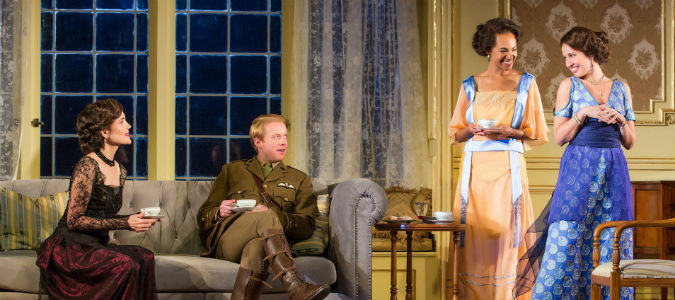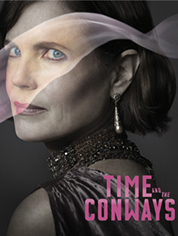

Time and the Conways
Opening Night: October 8, 2017
Closing: November 26, 2017
Theater: American Airlines
READ THE REVIEWS:
October 10, 2017
As its title suggests, J. B. Priestley’s “Time and the Conways,” now being revived on Broadway by the Roundabout Theater Company, concerns the workings of the cosmos and the workings of a family. We get to know the family better.
READ THE REVIEWOctober 10, 2017
“There’s a great devil in the universe, and we call it Time,” says Kay Conway, the aspiring novelist whose precognitive gifts pierce her psyche like knives, foreshadowing the undoing of her happy family over the 18-year span of Time and the Conways. This and other works by J.B. Priestley were heavily influenced by the theories of British philosopher J.W. Dunne, identifying time not as a linear succession of frozen instants but as a parallel dimension fusing past, present and future, in which the highs and lows of a life are secondary to the entirety of experience. Only one character in this lumpy but eventually intriguing drama, Kay’s contentedly dull, underachieving brother Alan, is able to grasp and take comfort from that altered consciousness.
READ THE REVIEWOctober 10, 2017
Casting Elizabeth McGovern in an England-between-the-wars dramedy would appear to be Broadway ringing the dinner bell for bereft Downton Abbey devotees who are hoping to spend a couple more hours in the company of Lady Cora.
READ THE REVIEWOctober 10, 2017
J.B. Priestley’s 1937 drama is about time, and its current Broadway revival, if nothing else, makes you aware of time passing. Formally inventive when it premiered, the play begins in the home of a large and well-off British family in 1919; it then skips forward to show us the same group, much the worse for wear, 18 years later—though the characters, inexplicably, are 19 years older—before returning us to 1919. There are a few minutes of philosophy about the slippery nature of time itself, but otherwise Time and the Conways has three discrete parts. Act I is all naive drawing-room frippery, with characters rushing about in fluffy fake mustaches for an offstage game of charahdes. Act II is all bitter internecine sniping; Act III is a half-hour exercise in heavy dramatic irony. (A girl who will die talks of how she will live; people whose hearts will break predict how happy they will surely be.)
READ THE REVIEWOctober 10, 2017
Sad, strange, supernatural, slow, static, stuffy, slight and stilted – English playwright J.B. Priestley’s three-act drawing room drama “Time and the Conways” is an intriguing but difficult, delicate and dated piece that has not received a major New York production since 1938.
READ THE REVIEW






















